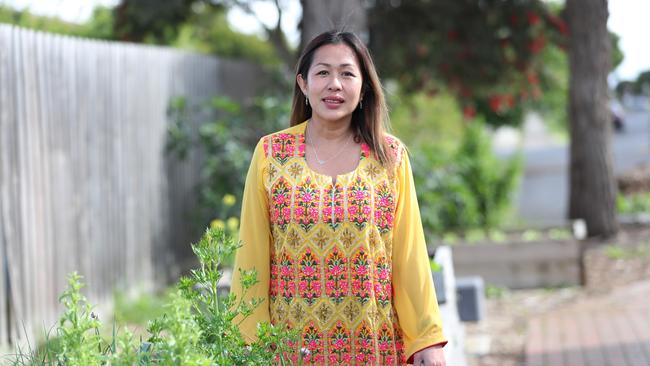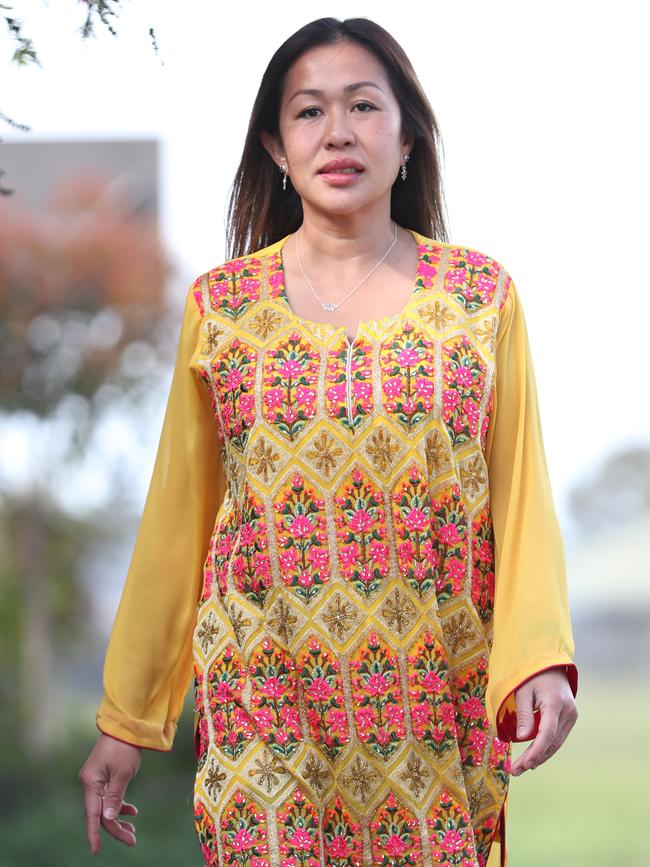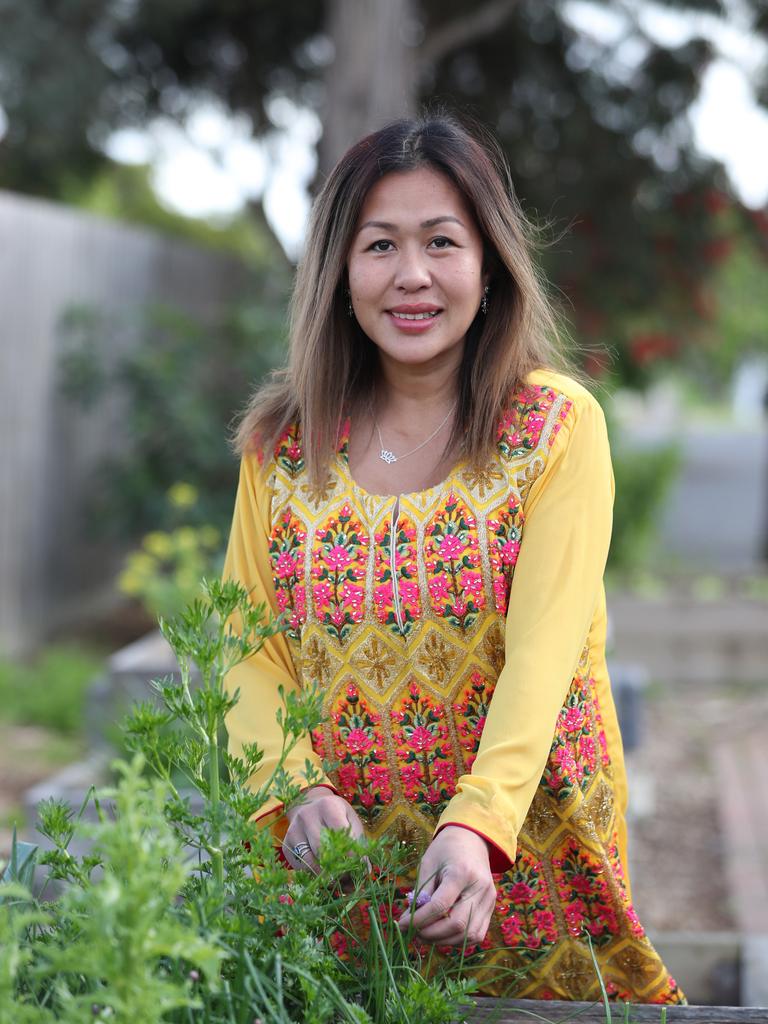Geelong woman Issara Saeyim says she was treated like a slave
Issara Saeyim was chasing her dreams and a life in Australia when she married a Geelong man. Instead she says she became a modern-day slave.

Geelong
Don't miss out on the headlines from Geelong. Followed categories will be added to My News.
When Issara Saeyim met and married a man who promised her a life in Australia, she knew her world would change forever.
The Thai national, then 29, dreamt of freedom and equality.
Instead, she said she was powerless and mistreated by her husband in Geelong for four years.
“I was treated like I have to cook, I have to clean, and I have to do everything to satisfy his needs,” she said.
“He asked me to clean the floor with my hands.
“When he came home, he would use his finger to check under the table and on top of the fridge.”

Ms Saeyim says she was treated like a slave, and the perpetrator was her own husband.
She said he had stripped her of her identity, confidence and self belief.
“I had to wait for him to come home to take me out to buy food,” she said.
“When I asked him ‘why?’, he said ‘because outside is not safe for you to go by yourself’.”
And if she ever said no, she said he would call her stupid.
“You don’t feel like you are a wife or partner, because they give orders … and you can’t say no,” she said.
According to the Australian Bureau of Statistics’ 2017 personal safety survey, one in five women had experienced sexual violence since the age of 15.
The survey revealed one in four women had experienced emotional abuse by a current or former partner since the same age.
In Victoria, the Royal Commission into Family Violence considered the introduction of specific offences for coercive control, but the government decided against it.
Sitting on a cold concrete slab outside the Cloverdale Community Centre where she now works, Ms Saeyim wears a bright yellow top.
She is not afraid to be seen anymore. It’s a sunny November day five years on from her ordeal. But even as the sun gives way to clouds and a biting chill, Ms Saeyim is smiling.
It’s a smile that speaks of her strength and self assurance.
Ms Saeyim said she fell in love with a handsome man she met on an online dating site, a man who told her wonderful things about the life they could have together in Australia.
When they met in person, he was not the same as he’d been online, she said. But he wanted to marry her, and in her culture, this meant a man had the utmost respect for a woman.
After six months they were wed and she was living in Geelong with him. But it was not the life he promised.
“From what he painted the picture of before I came to Australia, I was thinking that man and woman are the same. Women can go to work, and men can do housework, too,” Ms Saeyim said.
Holding her hands in her lap, with composure her past self may not have been able to muster, Ms Saeyim said she didn’t realise she was being mistreated.
“I thought, ‘OK, we’re husband and wife, this is the wife’s job,” she said.
Ms Saeyim said she was also mistreated in a range of businesses.
“(In one business) I asked how many hours would she like me to work, and how much pay per hour,” she said.
“She said to me ‘how dare you ask me how much money I’m going to pay you – I’ll pay what I want, and you’re lucky to have a job to work’.
“I was scared.
“I was thinking back to when I imagined Australia … how was this happening in a first-world country?”
Ms Saeyim said at a restaurant job, she did hours of work, answering phones, taking orders, serving food, washing dishes by hand and cleaning the kitchen, and was paid $40 for the shift.
Now 39, Ms Saeyim fought hard to escape that life.
She said she contacted a support line to help her leave her home and work and
had been “free” for about five years.
She said she had since met many other women in her work at the community centre who had left similar situations.
She said these women were treated like machines to satisfy their partners’ needs and they would constantly be told “this is normal”.
Ms Saeyim is also the founder and director of the Lotus Kitchen Project at the community centre, where a team of 10 volunteers cook affordable Thai meals.
All volunteers have left similar situations to Ms Saeyim.
She launched the project in 2020, to share her love of cooking and to help other women grow confidence in themselves.
What started out as Ms Saeyim doing cooking videos alone during the pandemic, has expanded to an operation delivering more than 600 meals weekly that brings women together.
A recently donated food truck will help them grow the business even more.
Ms Saeyim said the truck was “like hope”.
“I always had a dream (of) how good it would be if we had a choice, if we got treated like a human being, in a happy workplace, and we can support ourselves and our families,” she said.
“It’s a workplace (that’s) a supportive environment, loving, helping each other, and people get paid right.
“And it’s like a symbol. It’s showing our community that this food truck is run by these people that before maybe didn’t have the opportunity to work and to be supported, to get ahead in their life.
“And now, here, we treat them like a human being.
“People are going to see this and (know) this is how it should be.”

Now excited to go to work and know she’s valued, Ms Saeyim said she wanted others caught up in “modern slavery” to know there was a way out.
She said modern slavery was “not like slavery in the old days”.
“People would put chains on you, locked you up in a room,” she said.
“(Now) they give you a little bit of freedom.
“You’re in another country, and these people are the only people that you know, so (there’s) no need to lock you up.
“It’s a new way of slavery.
“It’s a promise – ‘I’m you’re friend, I’m your partner, I’m your family’ – and then using that to change you, to put chains on you.”
Ms Saeyim said she wanted others to know slavery was close to home.
“When you see a couple in the supermarket, you think they’re a normal couple … but at home (it could be different),” she said.
“When people treat you like that, there’s no love.
“There’s no relationship, it’s about ‘she does everything for me’.
“And then the law can’t do anything because it’s a relationship (on paper).
“They use that she came with him, she wanted to come to Australia, to have a better life.
“There’s another side that maybe people don’t see.
“Yes, we want to be in a better country that has a better system, but we don’t want to be a slave.
“It’s like a trap.”
Ms Saeyim said people might have different ideas of modern-day slavery or human trafficking.
“Maybe they think about the scary picture, (of) people being chained, people being put into a container and sent to a country, locked up and working day and night,” she said.
“But the (reality) is sometimes you’ll see people working in an Asian grocery, Thai restaurant, hairdresser, massage place, farm. You think they look okay … but they get treated badly.
“It’s very hard, but awareness is very important because if everybody said ‘this is not okay, we’re not going to support businesses that treat people like this’, maybe slowly things will change.”
For more information about the Lotus Kitchen visit a2bsupport.org/cause/lotuskitchen/
More Coverage
Originally published as Geelong woman Issara Saeyim says she was treated like a slave







